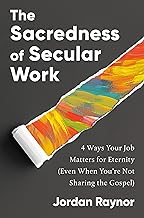
In the beginning God created heaven and earth… and work!
Scripture mentions work more than 800 times. Surely God has an interest and purpose in it.
To begin, I was uncomfortable with the use of the sacred/secular terminology because it is a false dichotomy which the title seemed to support. I soon realized Jordan knew readers would be comfortable with these terms. Then as he teaches about them he draws the two together and erases the dichotomy.
Raynor surveys the broad outline of the whole Gospel in the Bible with the familiar 4 Act Model.
1. Creation – God created the world and revealed His plan. He gave mankind the assignment/commission to continue the creation process he started.
2. The Fall – When sin came into the world it disrupted everything. Life became hard and dysfunctional.
“The curse broke much more than just our relationship with God . It broke everything God deemed good in Act 1 — human beings, the nonhuman world, and the world of work.” p.46
3. Redemption – God sent his son Jesus to redeem His creation and restore it. This leads to the fulfillment of God’s plan for the Kingdom of God where God and man will dwell eternally.
4. Renewal – The process has begun. It leads to a new heaven and new earth where God and His creation will enjoy each other forever.
“Jesus said that his kingdom will be implemented, at least in part, through you and me.” p.55
Our work has meaning because it gives God pleasure and because it is part of His plan for the Kingdom of God. Raynor’s examination of the Kingdom of God opened some new lines of thought for me.
Continue reading